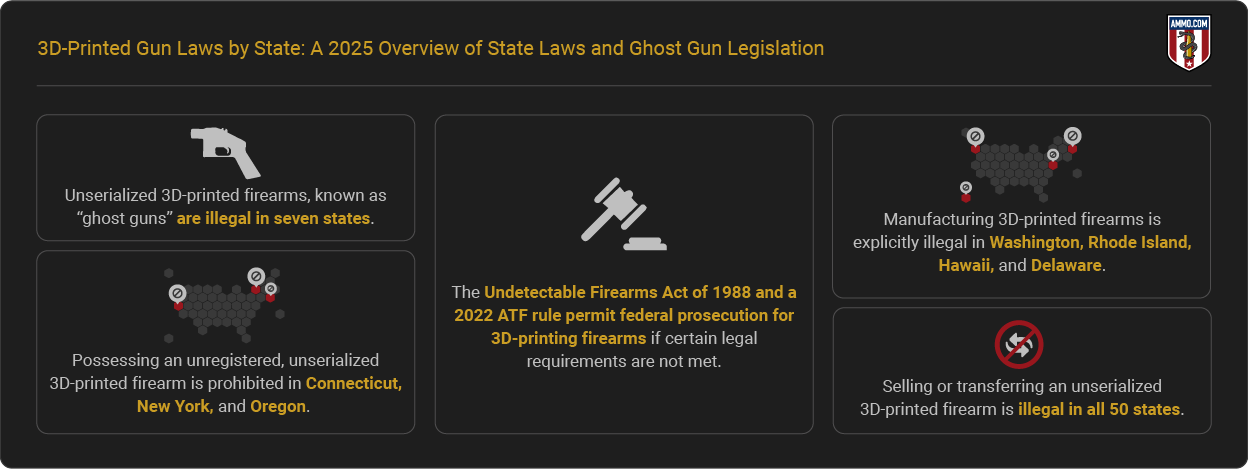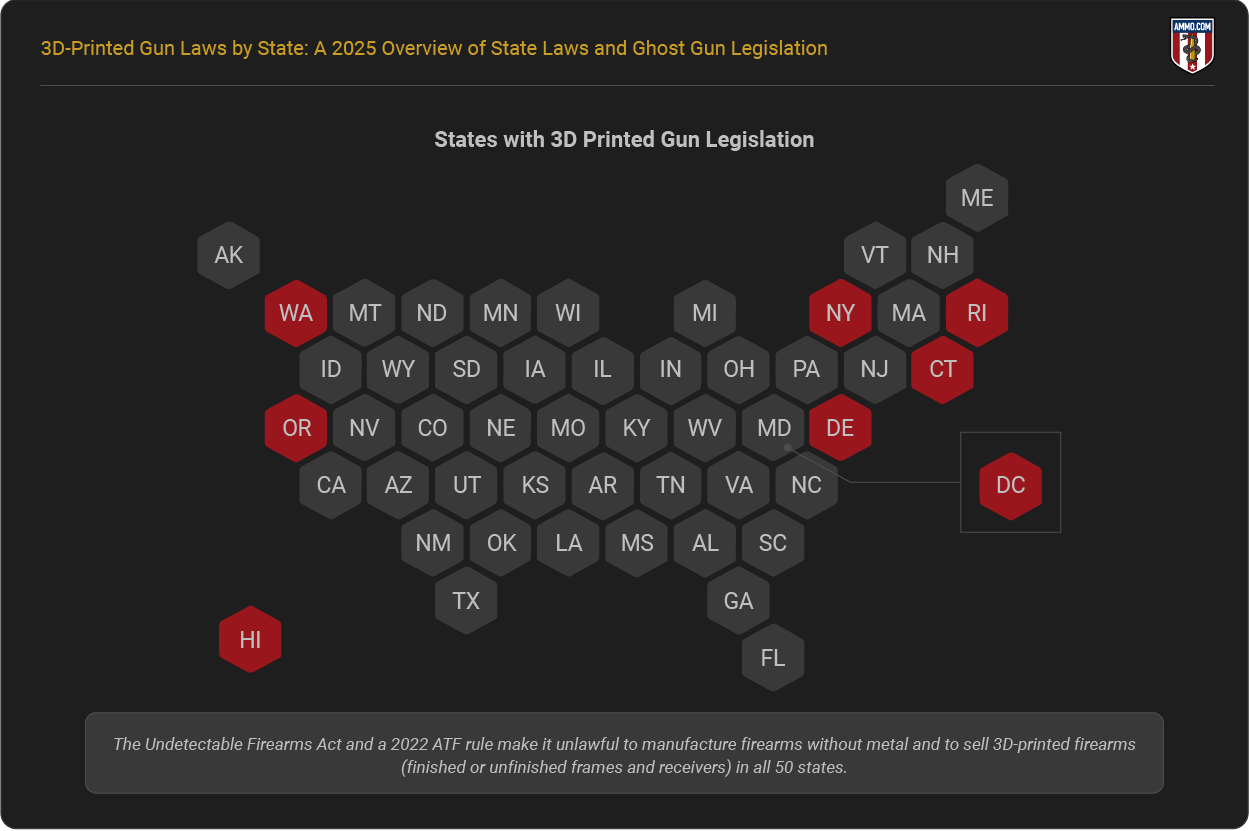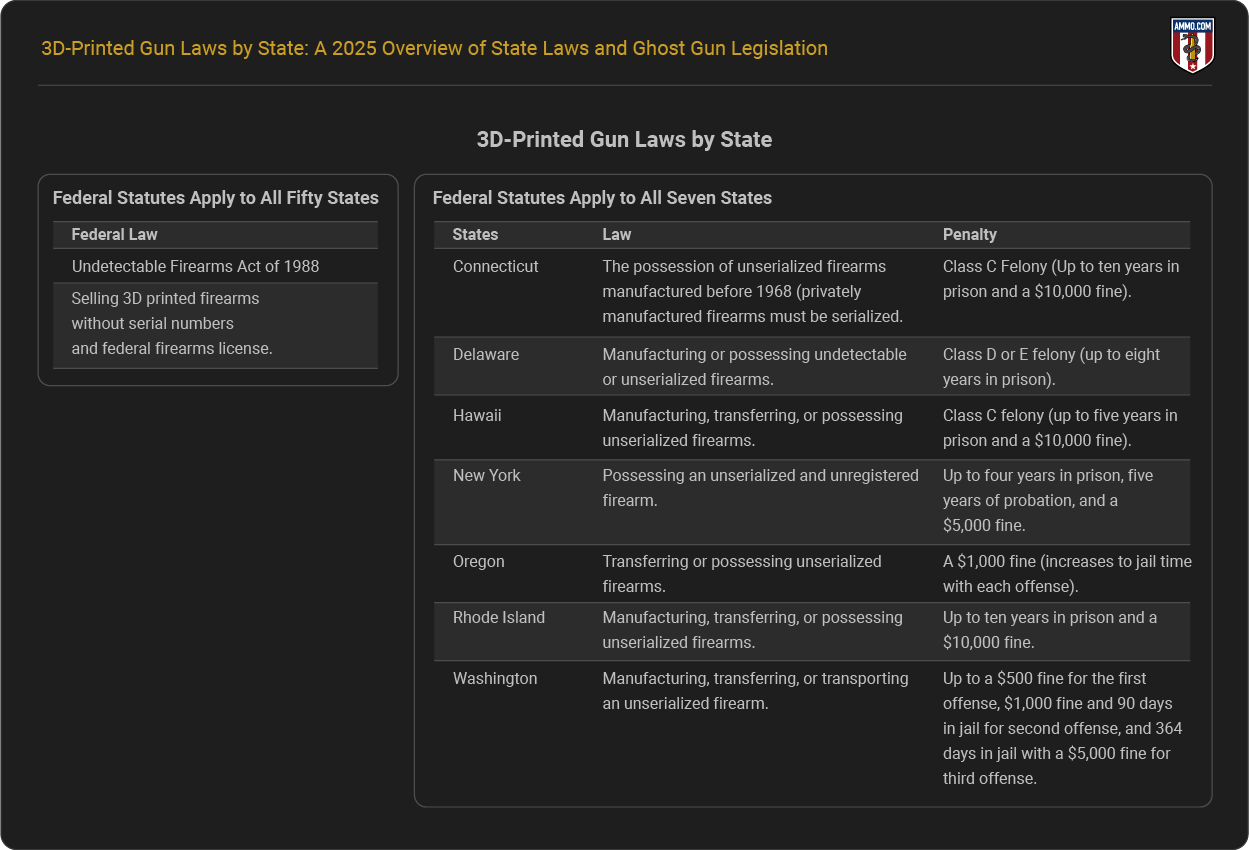3D-Printed Gun Laws by State: A 2025 Overview of State Laws and Ghost Gun Legislation
Date Published: March 8, 2025
Report Highlights: Federal and state laws allow prosecutors to charge unlicensed civilians with manufacturing, possessing, or transferring 3D-printed firearms.
Unserialized 3D-printed firearms, known as “ghost guns,” are illegal in seven states.
The Undetectable Firearms Act of 1988 and a 2022 ATF rule permit federal prosecution for 3D-printing firearms if certain legal requirements are not met.
Manufacturing 3D-printed firearms is explicitly illegal in Delaware, Hawaii, Rhode Island, and Washington.
Possessing an unregistered, unserialized 3D-printed firearm is prohibited in Connecticut, New York, and Oregon.
Selling or transferring an unserialized 3D-printed firearm is illegal in all 50 states.

Ammo.com provides reliable information from a variety of sources. You can view the sources used in this article HERE.
Methodology
Not all ghost guns are 3D-printed, but every unserialized 3D-printed firearm qualifies as a ghost gun.
The following sections outline state and federal laws that may result in prosecution for manufacturing, possessing, or transferring 3D-printed firearms. All information presented in this article is sourced from official state government statutes.
Disclaimer: We are not attorneys and do not provide legal advice. This information has not been reviewed by a legal professional and should not be interpreted as legal guidance.
Definitions
To better understand 3D-printed gun laws, it’s important to define key terms commonly used in state legislation.
- Ghost Guns: Unserialized and/or privately manufactured firearms
- 3D-Printed Firearms: Ghost guns produced using a three-dimensional printer
- Untraceable Firearms: Unserialized and unregistered firearms
- Undetectable Firearms: Firearms constructed entirely from materials that cannot be detected by a metal detector
How Many States Have Banned 3D-Printed Guns?

Seven states – Connecticut, Delaware, Hawaii, Rhode Island, Oregon, New York, and Washington – have laws that prohibit or regulate the manufacture and possession of 3D-printed firearms, allowing for prosecution in certain cases.
While state laws vary, each of these states restricts unlicensed civilians from possessing, manufacturing, or transferring unserialized firearms.
What Happens If You Get Caught With a Ghost Gun
Manufacturing, possessing, transferring, or transporting a ghost gun can lead to fines and imprisonment.
Violating federal laws and ATF regulations – such as manufacturing an undetectable firearm or transferring an unserialized firearm – can carry penalties of up to 10 years in prison.
State laws vary, but prosecutions often result in fines or prison sentences of up to eight years per offense.
3D-Printed Gun Laws by State

Federal Law – Restrictions on Selling and Manufacturing Certain Firearms
- Selling a 3D-printed, unserialized frame or receiver – whether finished or unfinished – is illegal.
- Manufacturing an undetectable firearm, meaning one that cannot be detected by a metal detector, is prohibited.
Connecticut – Ghost Gun, 3D-Printed Firearm, and Undetectable Firearm Ban
Source- Possessing an unserialized firearm manufactured before 1968 is illegal. Privately manufactured firearms must be serialized.
- Violations are classified as a Class C felony, carrying penalties of up to 10 years in prison and a $10,000 fine.
Delaware – Ghost Gun, 3D-Printed Firearm, and Undetectable Firearm Ban
SourceManufacturing or possessing an undetectable, 3D-printed, or unserialized firearm – including unfinished frames and receivers – is illegal.
Violations are classified as Class D or E felonies, carrying penalties of up to eight years in prison.
Note: In 2022, a federal judge issued an injunction stating that these provisions violate the Second Amendment.
Hawaii – Ghost Gun, 3D-Printed Firearm, and Undetectable Firearm Ban
Source- Manufacturing, transferring, or possessing an unserialized firearm – including finished or unfinished frames and receivers – is illegal.
- Violations are classified as a Class C felony, punishable by up to five years in prison and a $10,000 fine.
Rhode Island – Ghost Gun, 3D-Printed Firearm, and Undetectable Firearm Ban
Source- Manufacturing, selling, possessing, or transferring an unserialized firearm is illegal.
- Violations are punishable by up to 10 years in prison and a $10,000 fine.
Oregon – Ghost Gun and Undetectable Firearm Bans
Source- Selling, transferring, or possessing any firearm – finished or unfinished – manufactured without a serial number after 1968 is illegal.
- Violations result in a $1,000 fine for the first offense, with penalties escalating to jail time for subsequent offenses.
New York – Ghost Gun Ban
- Possessing an unserialized and unregistered firearm – whether a finished or unfinished frame or receiver – manufactured after 1968 is illegal.
- Violations are punishable by up to four years in prison, five years of probation, and a $5,000 fine.
Washington – Untraceable Firearms Prohibited (Unserialized)
SourceManufacturing, purchasing, transporting, or transferring an untraceable (unserialized) firearm is illegal, except for FFL dealers.
Penalties:
- First offense: Up to a $500 fine
- Second offense: Classified as a misdemeanor, punishable by up to 90 days in jail and a $1,000 fine
- Third offense: Classified as a gross misdemeanor, carrying penalties of up to 364 days in jail and a $5,000 fine – with one charge per firearm
Wrap-Up
Federal law restricts certain practices involving 3D-printed firearms nationwide, particularly regarding undetectable and unserialized guns. Additionally, seven states have enacted specific laws prohibiting manufacturing, selling, or possessing privately made firearms, including 3D-printed guns. These state-level restrictions vary in scope and penalties, with some imposing fines, felony charges, and significant prison sentences. As firearm regulations continue to evolve, individuals should stay informed about both federal and state laws to ensure compliance.
Sources:
- Undetectable Firearms Act 1988
- Privately Made Firearms (ATF)
- Ghost Gun Laws: Connecticut
- Ghost Gun Laws: Delaware
- Ghost Gun Laws: Hawaii
- Ghost Gun Laws: Rhode Island
- Ghost Gun Laws: Oregon
- Ghost Gun Laws: New York
- Ghost Gun Laws: Washington
Infographics
- Are Guns & Ammo The New Gold? Why More Americans Are Arming Themselves
- The Greatest Gun Salesman In America: President Barack Obama
- Shooting Straight: How Both Presidential Candidates Have Changed On Gun Control
- President Obama: (Still) The Greatest Gun Salesman in America
- An Inconvenient Truth: How The Obama Administration Became Earth's Largest Arms Dealer
- Armed Drones: President Obama's Weapon of Choice
- COVID-19 Data Study: Ammunition Sales Continue to Soar in Response to Coronavirus Panic
- Data Study: 18 Months of Ammo Sales during a Pandemic, Protests, and the Biden Presidency
- Data Study: U.S. Ammo Sales Surge Following Russian Invasion of Ukraine
- Most Gun-Friendly States in 2024
- Worst States to be a Gun Owner (2024 Updated)
- Children & Firearms: Definitions and Demographics Make All the Difference
- Urban Violent Crime & Legal Gun Ownership
- Gun-Free School Zone Laws & School Shootings (2024 Updated)
- Gun Control Laws and Enforcement Trends 2024
- Gun Ownership by State (2024 Statistics)
- How Many Gun Owners are in America? (2024 Statistics)
- Concealed Carry Crime Stats 2024
- Accidental Shooting Statistics: A Review of Unintentional Firearm Deaths from 1979-2024
- America’s Stolen Guns: A Silent Contributor to Gun Crimes in the U.S. (2024)
- Gun Violence Statistics 2024: Comprehensive Look at the Data
- Gun Laws vs. Crime Rates in 2024: A Comprehensive Analysis
- Gun Death Statistics by Caliber: A Review of Calibers and Crime in 2024
- Anti-Gun Control Arguments 2024: Facts Gun Control Lobby Suppress
- Guns in the Home Statistics: The Effects of Firearms in the Home in 2024
- Gun Deaths in the US: Analyzing At-Risk Demographics in 2024
- How Many Guns in the U.S.: All About America’s Firearms in 2024
- Gun Facts in the U.S. 2024: The Reality of Firearms in America
- Defensive Gun Use Statistics: America’s Life-Saving Gun Incidents (2024)
- Correlation Between Mass Shootings and Prescription Drugs (2024 Study)
- Gun Ownership by Gender in 2024: Closing the Gender Gap
- Murders by Weapon Type: September 2024 Statistics
- Gun Violence Among Black Americans: September 2024 Statistics
- The Ultimate Hunting Caliber Chart: Best Cartridge Per Species
- How Old Do You Have to be to Buy a Gun: A State Guide 2024
- Most Popular Guns in the U.S.: The Must-Have Guns in 2024
- Stray Bullet Deaths: Accident and Injury Statistics in September 2024
- Mass Shooters by Race: Demographics of Assailants 1966-2024
- Ammunition Limits By State in 2024: How Much Ammo Can You Buy?
- Why Do Americans Own Guns in 2024?
- How Many Americans Want Stricter Gun Laws in 2024?
- How Many Households in the U.S. Have a Gun in 2024?
- What Percentage of Gun Deaths are Suicides in 2024?
- Average Age of Mass Shooters in the U.S.
- Firearm Ownership in America by Year
- US Firearms Deaths Per Year: A Collective Report 1968-2024
- Percentage of Americans Owning Guns in 2024
- Texas Gun Ownership: Total Numbers, Trends, and Most Popular Guns
- Gun Ownership Statistics Colorado 2025: Trends & Numbers
- Hunting Accident Statistics 2025 (Causes & Trends Per Year)
- Banned Guns & Ammo List: A 2025 Review by State
- 3D Printed Gun Laws By State
- How To Build a Home Shooting Range: The Ultimate Guide
- States With the Highest Murder Rates
- Best Self-Defense Weapons for Women
